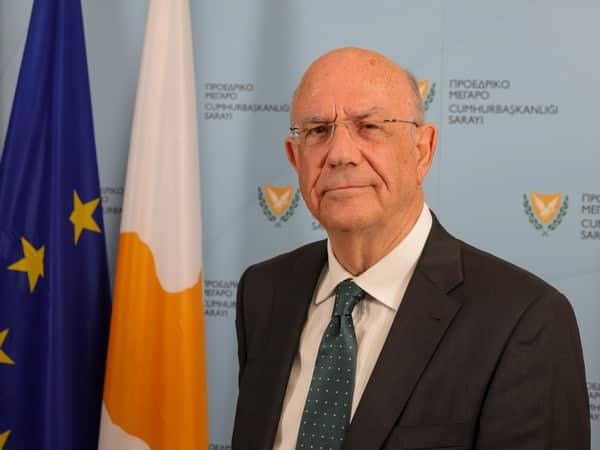‘Cyprus’ economy is doing better than most of EU’ (Update)
By Tom Cleaver
Finance Minister Makis Keravnos said on Friday that Cyprus’ economy is “operating at a better level than most countries in the European Union”.
Speaking to CyBC radio, he disputed claims that the country has not seen economic development since the current government.
“They said there is no economic development, but is it possible to give out what we have given out, nearly €300 million in economic measures in the last year, if we didn’t have economic development?
“To be given credit from those incredibly strict EU institutions – would that be possible without economic development? Our economy is performing better than most countries in the European Union at this point.”
He also defended the government’s decision not to extend the fuel subsidy past its expiry date on Monday, saying he had been warned against it by the EU and other international organisations.
He said the government had been given “strict warnings” by the European Commission against implementing and extending across-the-board economic measures, with targeted measures for vulnerable sections of society now favoured.
As well as this, he said, ahead of a planned meeting with representatives of the International Monetary Fund regarding their evaluation of Cyprus’ economy, he has been told “the only thing they find is those across-the-board measures, and they tell us we have to stop them.”
These sentiments were ratified by the IMF’s deputy chief Alex Pienkowski, who on Friday evening called on the Cypriot authorities to “resist” any further expansion of “non-targeted reductions in excise taxes and VAT”.
Pienkowski painted a largely rosy picture of Cyprus’ economy, however, also concurring with Keravnos’ view that Cyprus’ economy is performing better than many countries in Europe.
“Supported by strong policies, Cyprus has recovered quickly from the Covid-19 pandemic and has proven to be broadly resilient to multiple adverse shocks. Its growth rate is above most of its European partners and inflation is approaching two per cent,” he said.
This, he said, came “despite difficulties stemming from higher interest rates and weak activity among trading partners.”
Cyprus’ gross domestic product is expected to grow by about 2.5 per cent in 2024, with Pienkowski saying “rising real incomes are supporting growing consumer activity and foreign direct investment” as a driving force behind that growth.
He added, “fiscal performance continues to be strong, significantly reducing public debt.”
Looking ahead, he said government budget surpluses should be maintained until public debt falls “well below” 60 per cent of GDP.
In addition, he said, the government should “resist” further expansions of the cost-of-living allowance (CoLA).
The further development of Gesy and reforms to semi-state organisations are also “critical” to Cyprus’ financial growth, he said, adding that “it is important to ensure that public hospitals achieve financial self-sufficiency.”
He added that Cyprus’ financial sector “appears resilient but requires continued vigilance, including the non-banking financial sector.”
Keravnos was asked why, given international opinion consolidating against across-the-board-measures, he had taken the decision to extend seeming across-the-board measures with regard to the electricity bill subsidy and the zeroed VAT rate on basic products.
However, he disputed the characterisation of such measures as “across the board”.
“It is wrong to interpret the zeroed VAT and the electricity bill subsidy in this way. In fact, these are very targeted measures,” he said.
“The electricity bill subsidy operates on a sliding scale, with the level of subsidies offered depending on usage. This therefore is a targeted measure as it helps vulnerable people more,” he added.
On the matter of the zeroed VAT rate, he said “this policy is about 11 very specific everyday products. We haven’t abolished VAT across the board, we have just zeroed VAT on these very specific items to help people get by.”
He then moved on to speak about Cyprus’ middle class, saying “this government recognises what the middle class have gone through in the last few years because of economic crises and the crisis of the Covid-19 pandemic, among other things.
“Our aim is not to make more people live off handouts, but to restore the middle class.”
This is the reason, he said, why targeted measures have been introduced, with the hope that those measures will allow people to improve their own financial situations and grow the economy, rather than becoming reliant on government funding to make ends meet.







Click here to change your cookie preferences